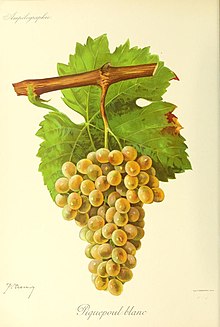Picpoul
| Piquepoul blanc | |
|---|---|
| Grape (Vitis) | |

Piquepoul in Viala & Vermorel
|
|
| Color of berry skin | Blanc |
| Species | Vitis vinifera |
| Also called | Picpoul, Picpoul blanc, Picpoul de Pinet |
| Origin | France |
| Notable regions | Languedoc |
| Notable wines | Picpoul de Pinet |
| Hazards | Fungal diseases |
| Piquepoul Gris | |
|---|---|
| Grape (Vitis) | |
| Color of berry skin | Gris |
| Species | Vitis vinifera |
| Also called | Piquepoul rose, Picpoul, Picpoul gris |
| Piquepoul noir | |
|---|---|
| Grape (Vitis) | |

Piquepoul Noir grapes
|
|
| Color of berry skin | Noir |
| Species | Vitis vinifera |
| Also called | Picpoul, Picpoul noir |
Piquepoul, Picpoul, or Picapoll is a variety of wine grape grown primarily in the Rhone Valley and Languedoc regions of France as well as Catalonia, Spain. It exists both in dark-skinned (Piquepoul noir) and light-skinned (Piquepoul blanc) versions, as well as a very little grown Piquepoul gris. Piquepoul blanc is the most common of the Piquepouls, with 1,000 hectares (2,500 acres) cultivated in France in 2000, and an increasing trend.
Piquepoul tends to bud late and has some sensitivity to powdery mildew.
Piquepoul has a long history in the Languedoc region, and along with Cinsault and Clairette blanche is one of the oldest domestic grape varieties of that region. It was blended with Clairette blanche to produce the wine Picardan in the 17th & 18th centuries.
After the Great French Wine Blight, when large shifts in varieties planted took place, Piquepoul lost popularity due to its susceptibility to fungal diseases such as powdery mildew and its low yield.
In Languedoc, Piquepoul blanc is used both for blending and for varietal wines. Red wines produced from Picpoul noir are high in alcohol, are richly scented, but have a very pale colour, which has made the variety more popular as a blending ingredient than as a producer of varietal wines.
Both the blanc and noir versions of Piquepoul are permitted blending grapes for the production of Châteauneuf-du-Pape. However, in 2004 only 0.15% of the appellation's surface was planted with the Piquepoul varieties.
In the New World, Piquepoul is being successfully grown in the foothills of the Chiricahua Mountains (5000 feet above sea level) in southern Arizona.
Piquepoul blanc is being grown in Sonoma, California.
...
Wikipedia
